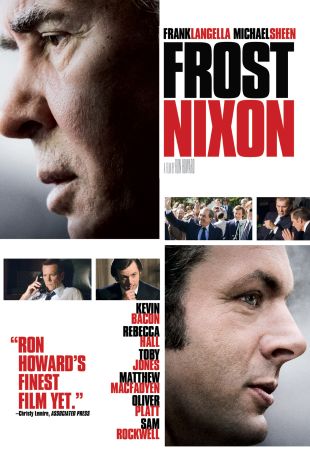
Critic David Thomson once pointed out that by the time Ron Howard was 30, he had already spent more time on television than anyone else his age. Those years working inside a TV show's tightly structured shooting schedule instilled in him an extremely efficient approach to directing, like the filmmakers during the heyday of the studio system. His movies are usually solid, middlebrow crowd pleasers that make up for their occasional lack of substance with first-class professionalism. Frost/Nixon turns out to be something much more, in part because it's one of the best scripts he's ever been handed. The movie, adapted by Peter Morgan from his award-wining play, analyzes how Richard Nixon (Frank Langella) sought image rehabilitation after Watergate by sitting down for a lengthy interview with British television personality David Frost (Michael Sheen). The screenplay nimbly establishes Frost as both a likable fellow with a natural gift for broadcasting and an incredibly shallow man whose interest in his interview subjects never extends beyond how good they are for his program. In a bid for both big ratings and industry respect, Frost offers to interview the disgraced former president Nixon, who accepts both because of the large payday and because he savors the opportunity to change the public's low opinion of him -- something he thinks will be easy to do because he considers Frost a lightweight. In any movie or play, portraying Nixon is difficult because so much footage of Tricky Dick is burned into the public consciousness. An actor could probably get by on pure mimicry -- Nixon's mannerisms and voice were remarkably unique -- but a mere impersonation will gloss over the depth of the character's inner turmoil. In Frank Langella's expert performance, he presents both Nixon's deeply embedded paranoia and his formidable intelligence as the reasons for his political rise, as well as his epic decline. Langella augments this Shakespearean level of tragedy with the character's almost total lack of natural social grace -- he doesn't feel any actual connection with other people. His social awkwardness pours out during a late-night phone call to Frost during which the former president fires off an alcohol-fueled rant about the grudges he's held on to since his school days -- grudges that fuel his anger and paranoia. Regardless of whether this call really happened, the scene allows Langella to do the kind of emotional high-wire act that brings this sensibly directed movie to life. It's the kind of focused performance that feels lived in, probably in large part because he played the role on Broadway. His performance also owes a debt to co-star Michael Sheen, who embodies Frost's shallowness with such ease that the character's slow acceptance of responsibility feels entirely genuine; he makes Frost a worthy opponent for Nixon. The two leads might have the showiest parts, but the rest of the cast offers flawless support. Oliver Platt and Sam Rockwell are great as Bob Zelnick and James Reston, the two journalists hired by Frost to help him prepare for the interviews. Platt is dependably brilliant, giving every single one of his lines a welcome comic spin, and Rockwell imbues the crusading Reston -- whose goal is to get a confession out of Nixon -- with a nervous energy that keeps viewers on edge. In addition to the performances and the screenplay, the timing of the movie makes it something special. Produced and released during the waning months of George W. Bush's second term, the film version of Frost/Nixon will be enjoyed by some as a wish-fulfillment fantasy. For those who would like to see Bush submit to an interrogation like this, the climax -- when Nixon does reveal his darkest impulses for Frost's cameras -- will trigger a much stronger dramatic catharsis than it might have otherwise. The timing gives Frost/Nixon a level of relevance that won't last past awards season; however, the craftsmanship, acting, and history lesson all make it among the most satisfying films of Ron Howard's career.
